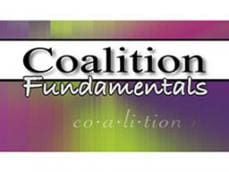Think of it as an hour filled with the answers to the questions you’ve always wanted to ask about coalitions, but haven’t. We’re going back to the basics, the fundamentals of what makes coalitions perfect vehicles for community-level change, what we need to know to be a meaningful partner of a coalition, and how we can make our coalition even more effective.
Want a better understanding of what the SPF is? How about a logic model? What exactly is cultural competency and how do I achieve it? During the hour-long broadcast Coalition Fundamentals, we’ll answer these questions and many more.
Key Concepts:
– Find out what a coalition is and what it is not
– Learn about coalition tools of the trade
– See how you can use the basics to advance the work of the coalition
Hosted by:
Mary Elizabeth Elliott, Vice President of Communications, Membership, and Information Technology, CADCA
Content Providers:
Doug Hughes, Executive Director of the Miami Coalition for a Safe and Drug Free Community (the Miami Coalition) Miami, FL
Hughes has served as Executive Director of the Miami Coalition since 2006. Prior to becoming director, Hughes spent 35 years in law enforcement and is a former director of the South Florida HIDTA and the Florida Governor’s Office of Drug Policy.
He currently serves on the Board of Directors for Community Anti-Drug Coalitions of America (CADCA).
Hughes earned both an AA and an AS in criminal justice from Miami-Dade Community College as well as a Bachelor’s degree in Public Administration and a Master’s degree in Human Resources Management from St. Thomas University.
Kristy M. Miller, Training Manager for CADCA’s National Coalition Institute
Prior to joining CADCA,, Kristy Miller served as Associate Director of the Louisiana Center Addressing Substance Use in Collegiate Communities (LaCASU). The mission of LaCASU and its related coalitions is to foster safe and healthy collegiate communities by reducing problems associated with students’ substance use through the process of collaboration among institutions of higher education and key community and state stakeholders.
Miller is a two-time alumnus of Louisiana State University (LSU), earning a Master’s degree in Public Administration and a Bachelor of Arts Degree in Mass Communication.
Michael Sparks, Alcohol Policy Specialist, CADCA Trainer
Michael Sparks is an Alcohol Policy Specialist working with communities across the country to reduce alcohol-related problems. Prior to moving to a consultant role, he served as an Associate Director for the Robert Wood Johnson Foundation-funded Free to Grow initiative at the Mailman School of Public Health at Columbia University. He also served as the first Executive Director of the Marin Institute for the Prevention of Alcohol and Other Drug Problems.
Sparks has expertise in the alcohol policy field as well as in the areas of community building, using local control strategies to manage problematic alcohol and drug environments, the legislative process, and neighborhood revitalization. He has provided training in the areas of community organizing, alcohol policy, using the legislative process to reduce alcohol and other drug problems, neighborhood revitalization and leadership development.
Sparks received a Master’s degree in Sociology from San Francisco State University in 1982



